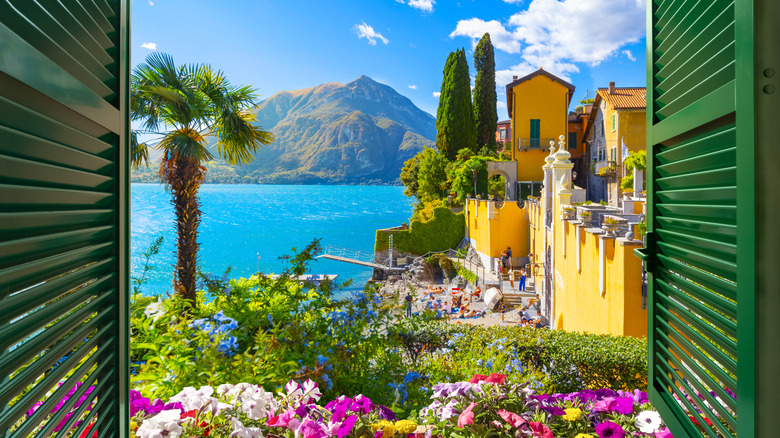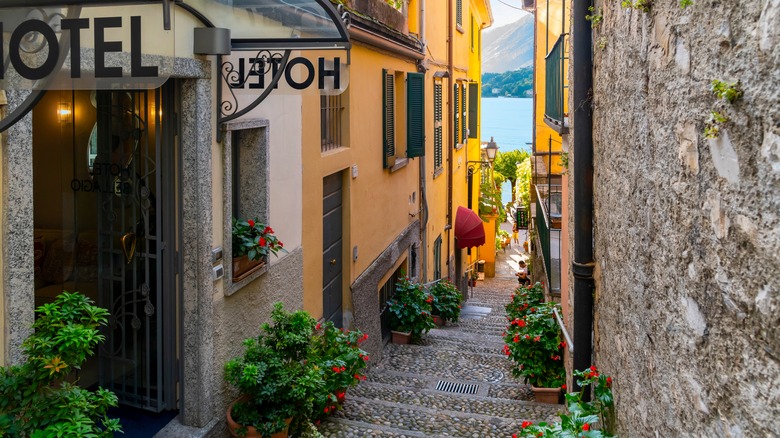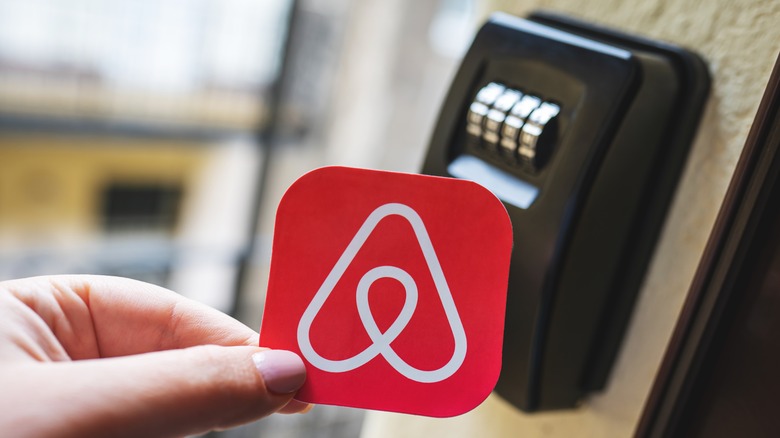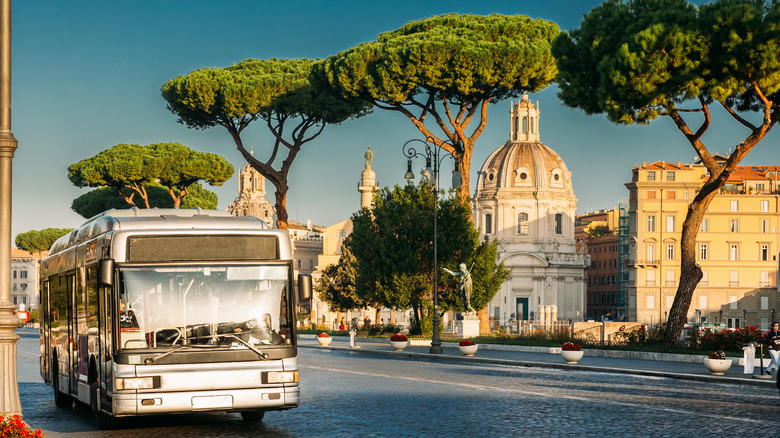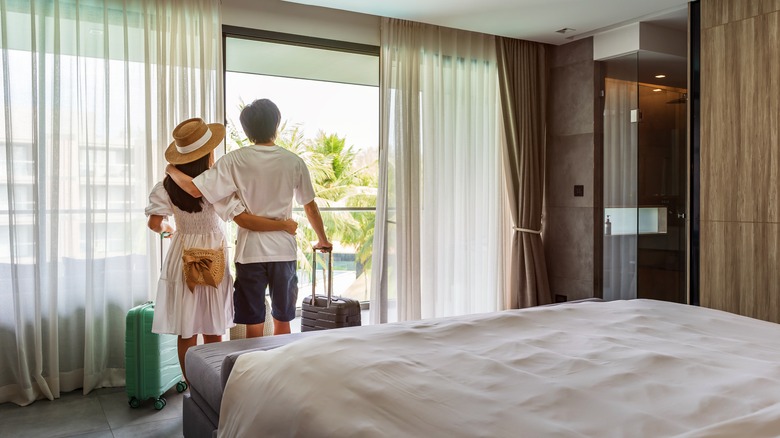Crucial Considerations When Choosing Between An Airbnb Or Hotel For Your Italian Vacation
Italy continues to be a top vacation destination, ranking fourth in the world for international visitors, with tourism numbers rising steadily over the years. Between 2006 and 2019, the country saw an increase of 23.4 million tourists annually, reaching 64.5 million total visitors just before the pandemic. In 2022, approximately 66% of visits were for vacation purposes, and with more travelers looking to relax comes an even greater demand for suitable places to accommodate them. So, if you're dreaming of an Italian vacation, know that it doesn't just start with a flight ticket — it also includes booking the right place to stay.
Although hotels (albergo in Italian) still dominate the travel market, accommodation options are no longer limited to such a traditional choice. There are several different types of stays in Italy, including bed and breakfasts, a farm stay for your next getaway, hostels, motels, villas, palaces, etc. Yet, an even stronger contender has emerged, coming second to hotels: Airbnb. According to data, 27% of total Italian accommodation bookings occur on this platform.
When making an informed decision between these two options, it is crucial to consider different factors while keeping in mind that each stay offers something unique. These include cost comparisons, available amenities, privacy and safety, flexibility, and accessibility. By doing so, you can focus on exploring and enjoying all that Italy has to offer without being let down by your lodging. After all, it's where you will spend the beginning and end of each day.
Cost comparison
An Italian vacation can become quite expensive if you don't make cost-effective choices from the start. So, let's begin with averages. The average nightly rates for Airbnbs in popular Italian cities such as Rome, Venice, Florence, and Milan range roughly from $160 to $250. Hotels, on the other hand, generally have higher nightly rates, averaging between approximately $170 and $270, depending on the city and star rating.
Although these prices may look attractive at first, you might be hit with additional fees during checkout. Specifically, review Airbnb cleaning fees before your stay, as they're listed separately from the overall price. The cleaning fee is flat, typically 20% to 30% of the listing, and is non-refundable after your stay. The host sets this, and the longer you stay, the lower the average nightly cleaning fee. Additionally, Airbnbs often offer discounts for weekly or monthly stays, reducing the overall cost. In contrast, hotels are less likely to provide such discounts, while their additional fees might include resort fees, minibar charges, and parking expenses.
Regardless, it's important to read the fine print to avoid any surprises on the day. Like the tourist tax for both Airbnbs and hotels! This typically ranges from $3 to $6 per night and is determined by the length of your stay, the region, and the accommodation type. Lastly, prices for both Airbnbs and hotels can vary significantly depending on the season. During peak tourist seasons, such as summer and major holidays, prices can surge.
Amenities, services, and the overall experience
It's no secret that accommodations in Italy, especially in major cities, can be expensive. However, it's all about finding value through the amenities, services, and overall experience hotels and Airbnbs provide. With hotels, don't expect a typical American experience; this is Europe, after all, and the buildings can be quite old. Therefore, European hotel rooms are much smaller. What you can expect is daily housekeeping and bidets, breakfast, and front desk support. Whereas Airbnb properties often include amenities like fully equipped kitchens, laundry facilities, and living spaces, ultimately providing a more home-like environment.
Of course, this is all relative to the hotel you choose and what it offers. In Italy, you can typically find special amenities like swimming pools and spas but expect to pay a hefty price for this luxury unless your hotel is outside the city center. On the other hand, Airbnb properties can offer exceptional local stays with unique features like private gardens, irregular historical architecture, and access to regular local life. Since hotels are often located in tourist-centric areas, which can be convenient for sightseeing, they simply cannot provide the same level of local immersion.
That said, Airbnb guests can enjoy authentic experiences such as cooking their own meals with local ingredients or taking advantage of their hosts' cultural insights and personal recommendations. Hotels, while offering professional staff and consistent service, lack this personal touch. Ultimately, if you prioritize comfort and predictability, hotels should always be your first choice.
Privacy and safety
When it comes to safety, the differences between hotels and Airbnbs are more pronounced. With hotels, you can rest assured of official safety regulations and standards, ensuring consistent measures like fire alarms, exit signs, security staff, and emergency procedures. You should strive to feel safer when staying in an Airbnb as they are just individually managed properties. Whenever you book an Airbnb, it's important to check things like the smoke or carbon monoxide detector or the availability of a first aid kit. These safety features are on the listing under Home Safety.
Needless to say, safety considerations extend beyond the interior features of your accommodation; you will need to evaluate the neighborhood as well to ensure a secure and enjoyable stay. Take Rome, for example: The closer you are to the city center, the more security measures are in place. Central areas often have higher police presence, better lighting, and more public activity, which ultimately contribute to a safer environment for visitors. Hotels, as they are typically situated in commercial districts, can be a much safer option.
Airbnb offers a wide range of privacy options. These range from homes or apartments, which provide complete privacy, to co-living stays with common areas and shared bathrooms. If privacy is a top concern, be sure to book an entire place for yourself. Always check the listing details to confirm the level of privacy offered. Moreover, hotels provide fully private rooms with ensuite facilities, guaranteeing a consistent level of privacy.
Flexibility and accessibility
When traveling on vacation, there are many factors outside your control. Although much is prebooked, having flexible accommodations is crucial. Unexpected events can occur, and the flexibility of your lodging can significantly impact your trip — both financially and logistically. Hotels normally offer more standardized cancellation policies, often allowing refundable cancellations up to 24 to 48 hours before check in, but in places like Italy, this can be a little different. It all depends on the contract and agreement you made with your booking. Airbnb is similar as it also varies by host and is solely dependent on the agreement. It's always advised to book flexibly rather than going with cheaper, non-refundable options. It will save you time, money, and stress in the long run.
Another crucial aspect to consider is streamlined check-in and check-out procedures. Traveling to your accommodations can be grueling, especially if you're coming from far away, and you want these processes to be as flexible and easy as possible. Hotels are reliable with their 24-hour front desk services compared to Airbnbs, which may or may not have convenient self-check-in instructions. This can add a layer of complexity, as you must stay in contact with your host to ensure smooth check-in and check-out processes. Moreover, before you even check in, you need to consider how you'll get there. Hotels typically have better access to public transportation, being situated near major transit routes and hubs. This makes them more convenient for travelers relying on public transport.
Other considerations
Lastly, some other considerations are equally important. Starting with interactions: In Italy, people are extremely friendly and love to say hello. You'll find many opportunities to practice your Italian in both an Airbnb and a hotel, even if it's just a buongiorno or buona notte! On a less positive note are the ethical implications of your stay.
Airbnbs can contribute to housing shortages and increased rents and purchase prices for locals. In cities like Venice and Florence, the expansion of short-term rentals has raised concerns about the impact on the local community and the availability of affordable housing. Generally, hotels don't impact local housing markets because they are designed for temporary stays without affecting residential opportunities.
In contrast, the rise in demand for Airbnb accommodations in Florence has led to an increase in condominium hotels, which now cost 30% more, according to the Wall Street Journal. As this is a real issue within Italy at the moment, it's hard to say what kind of rules and regulations will arise. However, Florence has taken action and implemented a strict change. As of October 2023, any new Airbnb listings are prohibited; only existing accommodations on the platform can continue. Therefore, with so much to consider, choosing a hotel or an Airbnb ultimately depends on your personal preferences and travel needs. Both options have unique advantages and potential drawbacks, and understanding these can help you make an informed decision that enhances your travel experience. Buon viaggio!
